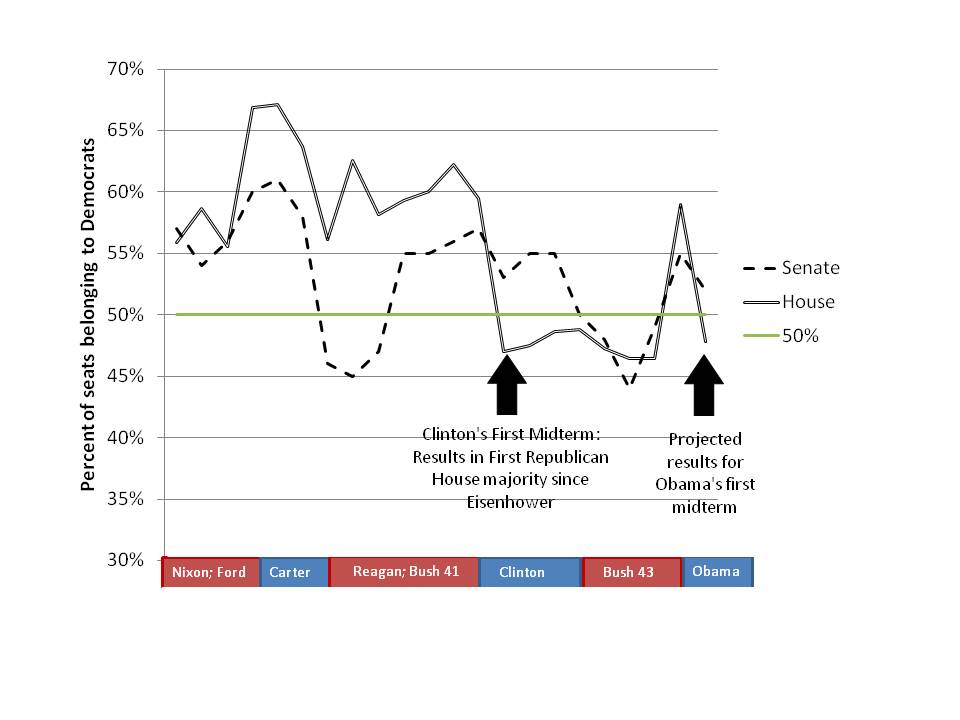The polls are humming with Nate Silver http://fivethirtyeight.blogs.nytimes.com/and much of the polling community predicting about a 50 vote Republican swing in the House and Democrats barely holding onto the Senate.
This Republican push is coming from a number of forces including Tea Party momentum with their "I am angry" rhetoric and general dissatisfaction with the current economy. Public Policy Polling reported that 19% of voters disapproved of both Obama and Republican Congressperson's job performance yet these mutually dissatisfied voters plan to support Republicans for Congress by a 76-6 margin this fall http://publicpolicypolling.blogspot.com/2010/09/angry-voters.html.
I can't help but feel like we've been here before. Bill Clinton came into the White House as a young, eloquent visionary riding the call for change in Washington after 12 years of Republican leadership. In 1994, Clinton's first midterm, the Republicans took control over the House for the first time in 40 years with Newt Gingrich and others proclaiming the Contract With America. Republicans stumbled in 1996 as their push for cutting taxes for the wealthy while simultaneously reducing Medicare benefits was political suicide. Meanwhile Bill Clinton was easily re-elected.
President Obama was elected with the highest percent voter turnout since 1968. His mantra of change resonated with young voters. As Obama faces his first midterm and the projected loss of Democratic control in the House, and possibly the Senate, the scenario from 1994 seems hauntingly familiar.
For some insight into this current situation, I interviewed Brett Di Resta, a political consultant and adjunct professor at George Washington University where he lectures on opposition research and campaigns.
HSF: You've heard my analogies between the 1994 and 2010 midterm election. How are these two situations different?"
Mr. Di Resta: Look, voter discontent isn't new. Recent polls show Obama, Pelosi and Reid are all unpopular, but are still more popular than Republicans. Voters aren't trying to put Republicans into office, but rather they are voting Democrats out though much of the anti-Democratic party feelings are simply due to the economy - if the unemployment was at 6% we wouldn't have this conversation. The current Republicans don't have a Contract With America. After Republicans get control of the House, they'll try a half-hearted repeal of the Health Care Reform but they known it would be disaster to try extending tax cuts for the wealthy and simultaneously cutting spending in order to balance the budget. Republicans won't repeat the error of 1996.
HSF: Some analysts have identified that Obama has been more visible in the campaigns in the last few weeks. How much impact will that have?
Mr. Di Resta: Very little. Obama has been priced into the political market. Bill Clinton has been more active politically and in some states he can move the needle. Bill represents the last time America had a roaring economy so that resonates with voters.
HSF: It seems that every few years we hear about a threat of fracturing within the Republican Party by fiscal conservatives, religious right and now Tea Party. Is this a legitimate risk or merely wishful thinking by liberal analysts?
Mr. Di Resta: Hoping that the Tea Party might fracture the GOP is just Washington Kabuki theater. The Tea Party is the GOP. The Tea Party rise is a product of anger though it is important to note that the worst numbers for Obama are from seniors, his base. Independents have not moved over to the Republican ticket.
HSF: After being crushed in the 1994 midterms, Clinton won in a landside in 1996. What will the midterms tell us about Obama's re-election chances?
Mr. Di Resta: A key indicator for 2012 will be the Democratic turnout for this midterm election. While 2012's voter turnout won't be as high as 2008's, strong Democratic turnout in 2010 may indicate a generational shift in voter participation and would be a good sign for Obama's re-election. While Republican numbers are up simply because the base is more excited, they will not be able to keep up this type of intensity into 2012.
As the midterm election results roll in, we will revisit the question of "what can we expect for the next 2 years?" but I am very interested in hearing your opinions, so please leave comments.
